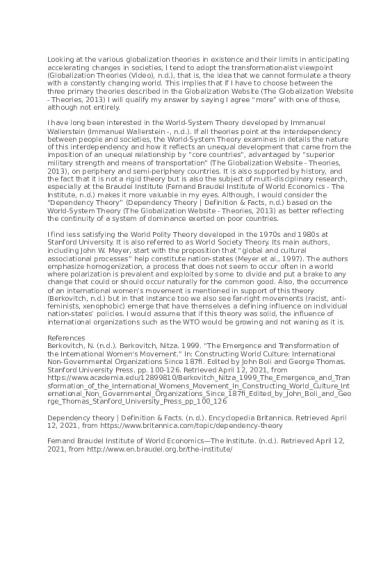POLS 1503 Discussion - Unit 1 PDF

| Title | POLS 1503 Discussion - Unit 1 |
|---|---|
| Course | Globalization |
| Institution | University of the People |
| Pages | 2 |
| File Size | 33 KB |
| File Type | |
| Total Downloads | 6 |
| Total Views | 144 |
Summary
POLS 1503 Discussion - Unit 1...
Description
Looking at the various globalization theories in existence and their limits in anticipating accelerating changes in societies, I tend to adopt the transformationalist viewpoint (Globalization Theories (Video), n.d.), that is, the idea that we cannot formulate a theory with a constantly changing world. This implies that if I have to choose between the three primary theories described in the Globalization Website (The Globalization Website - Theories, 2013) I will qualify my answer by saying I agree “more” with one of those, although not entirely. I have long been interested in the World-System Theory developed by Immanuel Wallerstein (Immanuel Wallerstein -, n.d.). If all theories point at the interdependency between people and societies, the World-System Theory examines in details the nature of this interdependency and how it reflects an unequal development that came from the imposition of an unequal relationship by “core countries”, advantaged by “superior military strength and means of transportation” (The Globalization Website - Theories, 2013), on periphery and semi-periphery countries. It is also supported by history, and the fact that it is not a rigid theory but is also the subject of multi-disciplinary research, especially at the Braudel Institute (Fernand Braudel Institute of World Economics - The Institute, n.d.) makes it more valuable in my eyes. Although, I would consider the “Dependency Theory” (Dependency Theory | Definition & Facts, n.d.) based on the World-System Theory (The Globalization Website - Theories, 2013) as better reflecting the continuity of a system of dominance exerted on poor countries. I find less satisfying the World Polity Theory developed in the 1970s and 1980s at Stanford University. It is also referred to as World Society Theory. Its main authors, including John W. Meyer, start with the proposition that “global and cultural associational processes” help constitute nation-states (Meyer et al., 1997). The authors emphasize homogenization, a process that does not seem to occur often in a world where polarization is prevalent and exploited by some to divide and put a brake to any change that could or should occur naturally for the common good. Also, the occurrence of an international women’s movement is mentioned in support of this theory (Berkovitch, n.d.) but in that instance too we also see far-right movements (racist, antifeminists, xenophobic) emerge that have themselves a defining influence on individual nation-states’ policies. I would assume that if this theory was solid, the influence of international organizations such as the WTO would be growing and not waning as it is. References Berkovitch, N. (n.d.). Berkovitch, Nitza. 1999. “The Emergence and Transformation of the International Women's Movement.” In: Constructing World Culture: International Non-Governmental Organizations Since 1875. Edited by John Boli and George Thomas. Stanford University Press. pp. 100-126. Retrieved April 12, 2021, from https://www.academia.edu/12899810/Berkovitch_Nitza_1999_The_Emergence_and_Tran sformation_of_the_International_Womens_Movement_In_Constructing_World_Culture_Int ernational_Non_Governmental_Organizations_Since_1875_Edited_by_John_Boli_and_Geo rge_Thomas_Stanford_University_Press_pp_100_126 Dependency theory | Definition & Facts. (n.d.). Encyclopedia Britannica. Retrieved April 12, 2021, from https://www.britannica.com/topic/dependency-theory Fernand Braudel Institute of World Economics—The Institute. (n.d.). Retrieved April 12, 2021, from http://www.en.braudel.org.br/the-institute/
Globalization theories (video). (n.d.). Khan Academy. Retrieved April 12, 2021, from https://www.khanacademy.org/test-prep/mcat/society-andculture/demographics/v/globalization-theories Immanuel Wallerstein -. (n.d.). Immanuel Wallerstein. Retrieved April 12, 2021, from https://iwallerstein.com/ Meyer, J. W., Boli, J., Thomas, G. M., & Ramirez, F. O. (1997). World Society and the Nation‐State. American Journal of Sociology, 103(1), 144–181. https://doi.org/10.1086/231174 The Globalization Website—Theories. (2013, May 29). https://web.archive.org/web/20130529201438/http://sociology.emory.edu:80/faculty/glo balization/theories01.html 619 words...
Similar Free PDFs

POLS 1503 Discussion - Unit 1
- 2 Pages

POLS 1503 Unit 1 - Self Quiz
- 3 Pages

POLS 1503 DF - Week 1
- 1 Pages

Globalization POLS 1503
- 4 Pages

POLS 1503 Unit 2 - Self Quiz
- 14 Pages

Unit 2 Discussion 1
- 3 Pages

Discussion Forum Unit 1
- 2 Pages

Unit 2 Discussion 1
- 4 Pages

Unit 1 Discussion Questions
- 3 Pages

Discussion Forum Unit 1
- 2 Pages
Popular Institutions
- Tinajero National High School - Annex
- Politeknik Caltex Riau
- Yokohama City University
- SGT University
- University of Al-Qadisiyah
- Divine Word College of Vigan
- Techniek College Rotterdam
- Universidade de Santiago
- Universiti Teknologi MARA Cawangan Johor Kampus Pasir Gudang
- Poltekkes Kemenkes Yogyakarta
- Baguio City National High School
- Colegio san marcos
- preparatoria uno
- Centro de Bachillerato Tecnológico Industrial y de Servicios No. 107
- Dalian Maritime University
- Quang Trung Secondary School
- Colegio Tecnológico en Informática
- Corporación Regional de Educación Superior
- Grupo CEDVA
- Dar Al Uloom University
- Centro de Estudios Preuniversitarios de la Universidad Nacional de Ingeniería
- 上智大学
- Aakash International School, Nuna Majara
- San Felipe Neri Catholic School
- Kang Chiao International School - New Taipei City
- Misamis Occidental National High School
- Institución Educativa Escuela Normal Juan Ladrilleros
- Kolehiyo ng Pantukan
- Batanes State College
- Instituto Continental
- Sekolah Menengah Kejuruan Kesehatan Kaltara (Tarakan)
- Colegio de La Inmaculada Concepcion - Cebu





